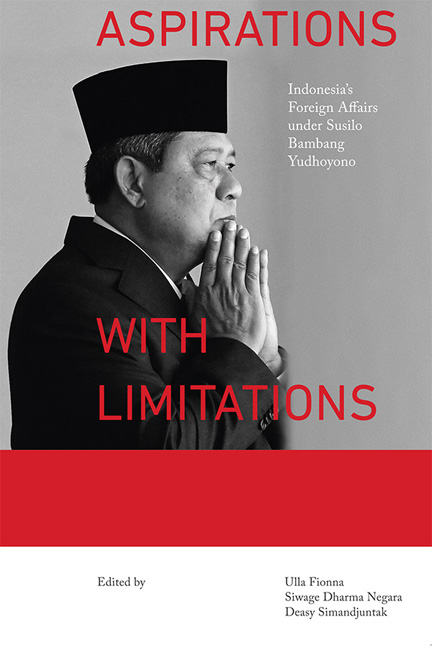Book contents
- Frontmatter
- Contents
- About the Contributors
- 1 Introduction
- 2 Indonesian Foreign Policy: Waging Peace, Stability, and Prosperity
- 3 Indonesia's Diplomatic and Strategic Position under Yudhoyono
- 4 International Economic Cooperation during the Yudhoyono Presidency
- 5 First Term Right, Second Term Shy: A Review of Indonesia's Economic Links with Key Trading Partners
- 6 International Labour Migration: A Very Mixed Blessing
- 7 Law Enforcement, Prevention, and Deradicalization: How SBY Handled Terrorism
- 8 Drifting towards Dynamic Equilibrium: Indonesia's South China Sea Policy under Yudhoyono
- 9 Uneasy Neighbours: Indonesia–Malaysia Relations under Yudhoyono
- 10 A Fair Dinkum Partnership? Australia–Indonesia Ties during the Yudhoyono Era
- 11 The Aceh Peace Process: Wheeling and Dealing behind Closed Doors
- Index
10 - A Fair Dinkum Partnership? Australia–Indonesia Ties during the Yudhoyono Era
Published online by Cambridge University Press: 08 June 2019
- Frontmatter
- Contents
- About the Contributors
- 1 Introduction
- 2 Indonesian Foreign Policy: Waging Peace, Stability, and Prosperity
- 3 Indonesia's Diplomatic and Strategic Position under Yudhoyono
- 4 International Economic Cooperation during the Yudhoyono Presidency
- 5 First Term Right, Second Term Shy: A Review of Indonesia's Economic Links with Key Trading Partners
- 6 International Labour Migration: A Very Mixed Blessing
- 7 Law Enforcement, Prevention, and Deradicalization: How SBY Handled Terrorism
- 8 Drifting towards Dynamic Equilibrium: Indonesia's South China Sea Policy under Yudhoyono
- 9 Uneasy Neighbours: Indonesia–Malaysia Relations under Yudhoyono
- 10 A Fair Dinkum Partnership? Australia–Indonesia Ties during the Yudhoyono Era
- 11 The Aceh Peace Process: Wheeling and Dealing behind Closed Doors
- Index
Summary
Over the course of Susilo Bambang Yudhoyono's presidency, Australia and Indonesia moved well beyond the pragmatic but distant relationship that had existed between the two countries since the 1999 crisis over East Timor. Government-to-government ties arguably reached a historic high point during Yudhoyono's second term, with a bilateral security treaty re-established, regular leader-level meetings taking place, and the Suharto-era dilemmas of cooperation with an authoritarian government firmly in the past. Yudhoyono himself contributed significantly to the deepening of ties. He was determined that Indonesia should have constructive external relations, as embodied in his much maligned “zero enemies, a thousand friends” foreign policy. He also had a personal connection to Australia, as his son was studying at Curtin University in Perth when Yudhoyono won office. None of Yudhoyono's counterparts as Australian prime minister held a similar connection to Indonesia, but they nevertheless mostly reciprocated Yudhoyono's desire for better bilateral ties. Yudhoyono's four presidential visits to Australia are one simple indicator of the intensifying intergovernmental relationship during his decade in power — Indonesia's five previous presidents had made only two visits between them.
Despite a new warmth and depth in bilateral ties, Australia– Indonesia relations remained beset by recurring crises on an annual basis during the Yudhoyono era. Transnational crime featured strongly in the causes, including the arrest and trial of Australian drug traffickers, the operation of people smuggling syndicates in facilitating the flow of asylum seekers to Australia, and public reactions to the punishments meted out to terrorists in Indonesia. But Australia and Indonesia also rowed over issues as diverse as the treatment of cattle in Indonesia, the arrival in Australia of asylum seekers from Papua, and Australian spying on Indonesia. Twice under Yudhoyono, Indonesia recalled its ambassador from Canberra, in 2006 and 2013. A positive spin on this pattern has been to term the relationship “cyclical” (Hyland 2006; Hogan 2014; Grattan 2015); a former Australian intelligence analyst instead mused whether bilateral ties were “condemned to crisis” (Ward 2015).
It has become a convention in analysis of the bilateral relationship to attribute significant fault for these ructions to the politicking of each country's leaders, and in particular to Australia's prime minister of the day.
- Type
- Chapter
- Information
- Aspirations with LimitationsIndonesia's Foreign Affairs under Susilo Bambang Yudhoyono, pp. 205 - 230Publisher: ISEAS–Yusof Ishak InstitutePrint publication year: 2018



